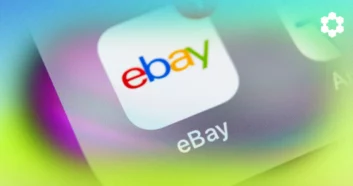It’s the end of an era: Cookies are no longer an omnipresent internet tracking tool.
While most internet users haven’t loved the idea of their every web-based move being followed by an intelligent data-modeling program, cookies have nonetheless been a boon for online businesses. For Amazon sellers, ecommerce marketers, and data scientists, this cache of browsing information has been invaluable.
As of this update Google Chrome will join Firefox and Safari in eliminating third-party cookies by late 2024. (Google originally intended to phase cookies out by early 2022, then pushed the date back to late 2023, and is now planning a phase-out beginning in Q1 of next year.)
Here’s a look at what cookies are, why they’re disappearing, and what sellers can do to adapt to a cookieless ecommerce world.
What Are Cookies?
Cookies are tiny snippets of data that web servers use to save a user’s browsing information. This allows websites to maintain a record of the device they’re using, their associated browser preferences, and a record of their online activity.
- First-party cookies, such as “session” cookies, do helpful things (like keep items in a shopping cart) and are typically deleted immediately after closing a browser. Session cookies are server-specific, so they can’t be passed to any machine other than the one that generated the cookie.
- Third-party cookies are designed to identify online activity data and send it back to website owners, who then use the data to improve their marketing outreach.
Cookies help sellers understand how to reach the right customers, create the purchasing pathways that customers want, and adjust marketing campaigns to meet customers’ needs.
If you’re using Google Analytics to track your website and ecommerce data — which you should be — you’re using cookies.
Why Are Cookies Disappearing?
Big search engine companies have been gradually reacting to a tidal wave of new privacy regulations and increasing pressure from consumers to provide more protections for online data (like proposed antitrust laws in the United States). Even though that pressure has been building for years, consumers really began to make noise back in 2020.
In response, Apple’s Safari and other internet browsers have phased out third-party cookies. Apple’s App Store now asks the user’s permission to track their data across third-party apps before installing. Google has made commitments to phase out their third-party cookies as well but, as noted, has delayed that phase-out. They’ve chosen instead to take a slower approach to give brands and marketers time to plan their next steps.
In Europe steps in this direction were taken years ago. The EU set regulations that placed restrictions on how companies can use cookies when, in 2019, Europe’s highest court launched the General Data Protection Regulation (GDPR), which stated that European users must actively consent to all cookies when they log on to a website. If they don’t, the website can’t use analytics or web-tracking cookies on that browser.
While this did not directly phase out tracking cookies, it put control into the hands of the user – with the added benefit of dramatically raising user awareness. Cookies were brought to the forefront.
Now we’re looking at their complete elimination.
Cookieless Marketing Solutions for Amazon Sellers
When it comes to identifying the ideal customer, a cookieless ecommerce world is going to create challenges for many sellers. Here are some strategies to help you blaze the first-party data trail into 2024 and beyond.
Contextual Advertising
Many effective advertising campaigns don’t need third-party data at all.
The best cookieless strategy? Contextual targeting.
This strategy uses contextual intelligence based on a website’s content to display similar ads. If someone is browsing a site that sells fishing rods, for example, they might be shown ads for fishing lures.
Contextual ads — which are driven by advances in machine learning, data modeling, and artificial intelligence — aren’t subject to privacy regulations because they don’t use or collect cookies. Instead, they use the context of a shopper’s journey to match the ad content with the specific product a user is searching for. In doing so, they’re able to help an advertiser align the targeted ad with a shopper’s taste and values.
Authenticated Targeting

Websites are increasingly using authenticated targeting to obtain a user’s consent before the user is able to access content. This usually takes the form of a permission or login screen that blocks website content from view until the user approves the use of cookies.
When a user agrees, they’re allowing the site to record first-party data about their visit and, in many cases, allowing other companies to collect data, as well.
This strategy works for sellers who still want the user data that cookies supply but are keen to stay compliant with ever-growing privacy regulations.
People-Based Marketing
People-based marketing helps fill in the gaps in your search for applicable data.
There are two ways this technology can identify users:
- A deterministic match uses a unique data point, such as an email address, to identify a user. Apps that require an email login, such as Google or Facebook, can use the email to identify a specific user.
- A probabilistic match makes informed assumptions about a user and their browsing history. If a site logs the same IP address from a laptop and a smartphone, they’ll assume it’s the same user and market toward that user.
People-based marketing targets the humans behind the browsing, making advertising that much more connective and engaging.
Second-Party Partnerships
With second-party data, businesses “partner” with each other to gather and share mutually beneficial information about their potential customers.
The effectiveness of second-party data is dependent upon the relationships that marketers are able to develop. That’s why it’s often referred to as “someone else’s first-party data.”
Paid Data

One simple solution to getting cookies? Pay customers for it.
Forbes magazine, for example, will soon offer customers a reduced ad option in exchange for an email address. And Forbes isn’t alone. Many other subscription-based companies are offering discounted rates, special features, and other perks for customer data.
While this model requires an initial investment, the targeted marketing gains can pay dividends.
Data Cleanrooms
Data cleanrooms are digitally-walled environments where Google, Facebook, and Amazon can share aggregated customer data with advertisers.
They create models using first-party data that allow advertisers to see how they compare to other platforms’ aggregated data. By looking at the comparies and investigating inconsistencies, marketers can make informed decisions about their ad campaigns.
Google Topics
As part of its Privacy Sandbox, Google Chrome is rolling out a new initiative called Topics. It’s meant to replace third-party cookies by showing ads based on the topic pages a user visits, rather than the cohort they belong to.
This tool will assign “topics” to users based on the websites they visit. Then, it will match the user with companies, publishers, and advertisers that align with those topics.
Other Ways
A method called zero-party data is another way to stay strong in your advertising game. It can also be fun and engaging for your customers.
The zero-party method is where the customer shares data with you on purpose, usually through quizzes/polls, website activity, customer profiles, messages back and forth, and so on.
For example you might have a fun quiz on your site, where the customer answers questions voluntarily, shares details about their favorite products, reasons for their choices, personal preferences, etc.
Another option is targeted ads on social media. This now-classic method is as effective and as valid as ever, giving you many ways to reach your desired demographic.
Filling In the Data Gaps
For some Amazon sellers, the thought of filling in their customer data gaps from cookieless marketing is overwhelming at best. Fortunately, there are tools that can help.
Carbon6’s PixelMe is a patent-pending off-Amazon advertising and attribution tool that allows you to stand on the shoulders of giant companies such as Google, Facebook, and Tiktok to track Amazon conversions. Amazon sellers can embed pixels into every off-Amazon link to target new customers, improve rank, and earn Amazon referral bonuses.
PixelMe can help you successfully market your business in a cookieless world with features such as:
- Aggregated data to clearly show you which keywords are making or losing you money
- Keyword tools that help you drastically improve your Amazon product ranking
- Retargeting campaigns to leverage customer data and increase referrals.
Find out how you can increase rank and conversions in under 60 days. Start a FREE ASIN Opportunity Audit here.




